When you go to shows like the Amelia Island Concours they usually have a number of cars on the field that you have never heard of or have only seen in pictures. This 1956 Pontiac Superior Coach camper, if restored, would definitely earn its place in the lineup. For sale on craigslist in Long Beach, California for the fairly reasonable sum of $10,500, this vehicle is advertised by the seller as a prototype for Superior Coach to enter the recreational vehicle market. However, is it a legitimate prototype from Superior or an exceptionally well made but homemade camper crafted in a suburban SoCal garage? Is it even a camper?
The seller offers no documentation in the ad to verify the prototype claim. However, this data plate from Superior Coach is somewhere on the car. Most likely it is on the “cab” portion. My understanding is that coachbuilders would buy cars from manufacturers in “cab and chassis” form. The cab is the front section of the body to the pillars behind the front door, with the chassis being the full frame that these cars rode on. Form there they would build bodies to sell to end users based on their needs. Nearly all went to ambulance services and funeral homes. Often, they were the same thing. Believe it or not the funeral homes used to provide ambulance services as well.
So, let’s explore the theory that this was an actual camper prototype made by Superior Coach. First off, the body number on the data plate should correspond to something in the records of the company. Superior did go through a number of mergers in its lifetime, so records could get lost. From there, the next step would be an inquiry on the Professional Car Society forum. Surely someone in this long standing club could verify this vehicle’s provenance.
Looking at it from a camping perspective, there are a few glaring questions. The first thing that hits you is how claustrophobic you would be in this mostly windowless vehicle. Second would be the surety that it would be almost uninhabitable in full sun. This vehicle was built before portable air conditioners were really popular. While the top does lift up to provide room to walk around, you would think a canvas would connect the roof with the body when extended.
The pop outs on the sides also bring up some questions. Pop outs are usually used as a bed area on modern campers. Are these where you sleep? Do they seal up tight to keep rain and bugs out? If you have ever been camping you know about mosquitos and how relentless they are at finding you and making you pay for sins you haven’t committed yet. While the aluminum would likely be thick enough to keep the little monsters from stabbing through, they would set up a bloodsucker highway through the gap we see above.
The photo above gives us an exterior view of the raised roof. The seller tells us that the top is motorized and that it goes up about three feet to allow a person inside to stand upright. We are also told that a new solenoid will be required. There is no trace of any canvas between the body and the roof. How would it attach?
A look inside reveals some soggy looking floors. However, we cannot see ground through any holes. The vinyl seats are covered with blankets that are likely covering up the usual dried out vinyl rips and tears. Everything else looks to be there and functional. It even comes with the famous “three on the tree,” which could be considered an anti-theft device at this point.
Above we get a good view of the roof. It appears that there is a cable system that pulls the roof up while pulling out supports on both sides. The fold down seats could possibly be used as a bed or could allow access to the rear compartment from the front seat area. The somewhat lumpy material we see on the roof panel is likely insulation. A metal box would surely need a lot of insulation no matter what season you are in.
A look to the rear is where the mystery deepens. While the newer popcorn machine makes you think this is some sort of fair wagon and the flat counter like panels above the wheel wells support that theory. The problem with that is that the floor is so close to the counter. How would you serve customers?
Under the hood is a Pontiac V-8 that the seller tells us fires up when you pour gas in the carburetor but will at least need a carburetor rebuild. You could safely assume a full fuel system cleanout would be in order. Pontiac’s V-8 had about 316 cubic inches of displacement for 1956, and the base engine had 173 horsepower. There were some higher horsepower options available, but there is no mention in the ad of anything special.
So, what do you think this Pontiac was built for? Is it a food wagon, a camper, or did it have another purpose in life? Let us know your guess in the comments.

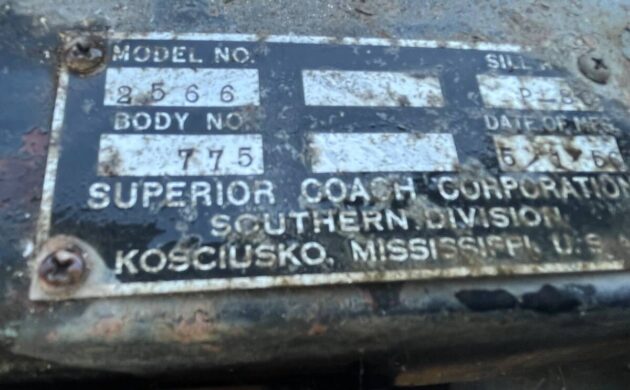
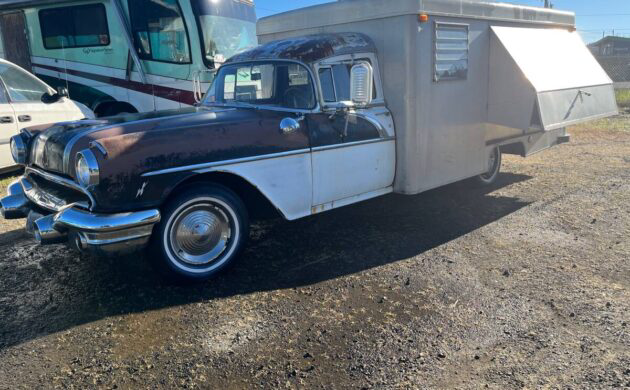
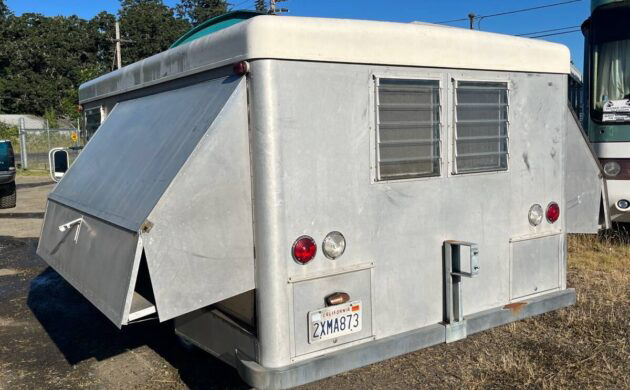
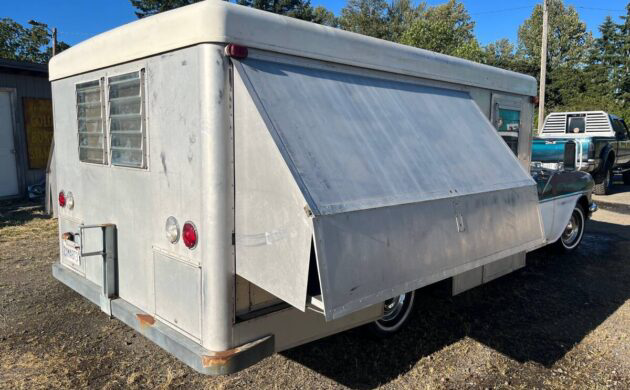
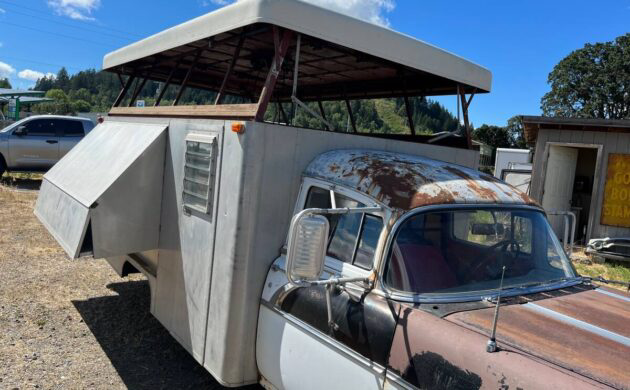
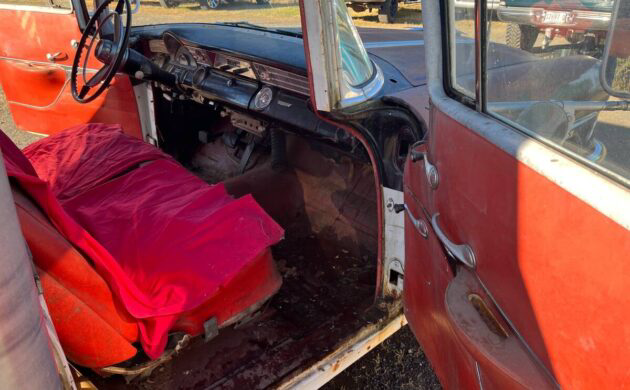
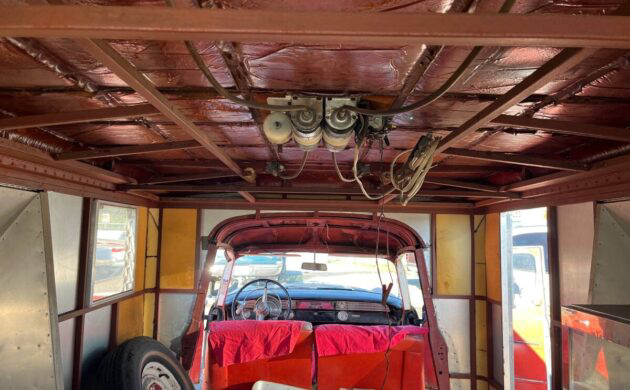
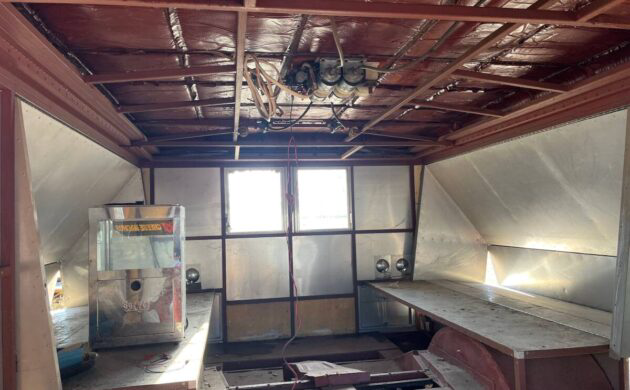
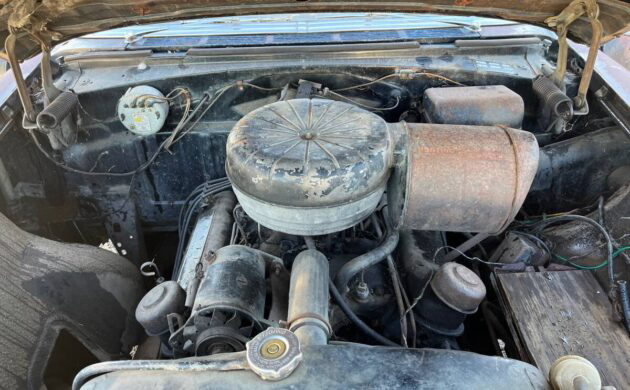



Wasn’t this featured here before?
It’s actually located in Eugene,Oregon.
Featured by Russ last Dec. Apparently, it made it from Oregin'[sic] for $6700, “FIRM”, the original ad said,,, to California, where the fleecing continues. I think we’ve determined, it was built by Superior, but never took, so it’s indeed pretty rare. It’s too well built for a backyard hack job. Not to sound redundant, but pretty clear proof, some folks live in their own world, asking $10gs for this junk.
Those picture were defininatly taken in Eugene,Oregon.
It is a camper. It would have had canvas and screen between the top and body for air flow. You sleep in the fold outs like a more modern pop up camper. It would be a cool resto rod camper towing a vintage A/G car or a vintage Indian or what ever but more like a 5k car.
This looks like it will cook you like an easy bake oven.
It must be a mistake from the seller, you know its easy to double press on a button !
He really meant to type in $1000.00
Not rare at all. Was one just like it on Dec. 16, 2021 on Barnfinds. that one was in Eugene, OR for “only” $6700….flippers be flippin
I wanted a collector car. My wife wanted a camper. So we comprimised.
Use to be an Ambulance or Hearse, no thanks.
Excellent way to butcher a perfectly good Pomtiac.
This looks like a good home built on a Superior hearse. Superior did go in the RV business in 1970 with a class A motor home. They did look at converting one of their school buses but settled on the motor home. No way does this thing look like something Superiors engineers would have done.
As someone who has owned 3 Superior Pontiacs [’56, 58 & 60], I am familiar with the marque. As I recall, the Superior body #2566 means it was a limousine style ambulance, meaning the rear quarter panels had windows. The Superior ambulances also had a panel below the glove box door that contained all the special switches for exterior lights and rear interior lights. That switch panel is still in the correct place.
Every factory produced camper on a hearse or ambulance chassis that I’ve ever seen had bucket seats, so it was easy to go from the front to the rear. This car has the same folding front seat as either the standard Ambulance or Hearse had, to allow access to storage behind the seat. That seat and the front door panels are the same material and color I had in my 1956 & ’58 Pontiac Superior hi-top ambulances originally used by the US military, who bought much of the Superior Pontiac production each year.
In addition, Superior constructed their vehicles in steel only. This camper uses aluminum with a fiberglass roof. The difference in construction of non-steel bodies involves far more than just the sheet metal change. It’s also a completely different system of fasteners, construction design, and painting techniques. This camper was made by a company already familiar with Alloy construction, and as this vehicle is in the upper west coast where a great number of WW2 airplanes were constructed, I propose this was constructed by a former aircraft body sub assembly company, familiar with alloy metals.
So I seriously doubt this camper body was crafted by Superior. As superior was contracted with GM to supply GM based chassis and front body shells, when I see Ford parts used in the camper top raising setup, That’s another reason I think it’s an aftermarket builder. The motors, geared drives and cable system to raise and lower the top & trunk lid are almost certainly from the 1957 to 1959 Ford Skyliner [Retractable]. I can’t see for sure, but the motors appear to be the 1959 and newer trunk lid raise/lower and lid lock/unlock versions.
As a special raise and lower top system would take time to commercially develop, and the Retract didn’t come out until 1957, that’s another reason to discount Superior building this in 1956. I was one of the last Ford mechanics to attend the final course on repairing the Skyliner/T-bird/Lincoln convertible top systems in 1970, so I know these parts well.
Don’t get me wrong, as someone who likes unusual vehicles and has owned Cadillac & Pontiac campers, I would love to own this Pontiac, but not only am I too old now, but the listing is deleted!
No tanka yuu.
Wow…this rules…if only I had the space to work on it…!!! I wonder how wide it is? Likely no room to get around it in my 9-foot wide driveway…hmmm though…hmmmm…
There was a mid-west body shop owner back in the 50’s that would buy rear ended cars and do a conversion into a camper, seems to me he built about 50 of them. This one has the higher roof so I’m guessing it was an ambulance at one time
Looks like it should be hauling puppy mill puppies out of the Amish hills of Pennsylvania.
Looks to be an old body hauler